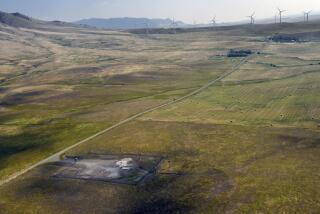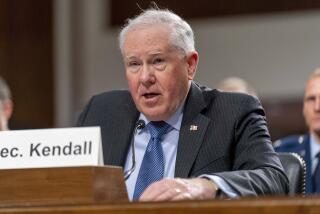Air Force Seeks Easier Access for Health Officials : OSHA Lacked Inspectors to Study Stealth Plant
- Share via
The Air Force is urging federal occupational health officials to obtain security clearances for more inspectors so they can keep closer watch on hazardous chemical use in classified manufacturing projects, such as Lockheed’s stealth fighter workshop in Burbank, a high-ranking Pentagon official said Tuesday.
“They should have enough people with clearances,” said Gary D. Vest, deputy assistant secretary of the Air Force for the environment, safety and occupational health.
He met with the 10 regional administrators of the Occupational Safety and Health Administration in Orlando, Fla., three weeks ago, Vest said in an interview, “and I stressed to them that they needed to look at all the activities in their areas and make sure they have enough people with security clearances that they can actually inspect these places.”
About 75 Lockheed workers have brought a lawsuit, and about 150 have filed worker’s compensation claims, complaining that they suffer from ailments brought on by exposure to hazardous substances while building stealth aircraft from composites. The workers charged that they suffer from ailments ranging from skin rashes and headaches to memory loss and cancer.
Their attorney alleges that at least five workers have died of related causes. The attorney has refused to identify the dead.
Afraid to Report Problems
Composites are lightweight plastic-like materials of great strength that are increasingly used in aircraft and other products. They are essential to stealth planes, which are designed to avoid detection by radar, because they do not reflect radar waves as readily as metals.
Lockheed employees have argued that their work was so secret that they were afraid to report health problems to their doctors for fear of violating classified information laws. They have complained that the highly classified “skunk works,” where secret aircraft are built, was not properly inspected because Lockheed could turn away OSHA inspectors who did not have the required security clearances.
Pentagon and federal OSHA inspectors went to the plant in Burbank in September after widespread news reports about complaints by Lockheed workers and employees of Boeing in Seattle, which uses composite materials in civilian jetliners.
OSHA had to fly in an inspector with a security clearance from Salt Lake City to enter the classified area. OSHA sources said California OSHA inspectors had been turned away for lack of security clearances.
The inspectors have made no public report.
Vest said he could not talk about Lockheed specifically while the workers’ cases are in the courts but had spoken to OSHA officials about the general problem of hazardous materials at all classified manufacturing plants.
But following the allegations that hundreds of workers at Lockheed and Boeing have suffered what may be permanent physical damage from working with the composite materials, the Air Force is organizing a symposium on the subject, Vest said.
More to Read
Sign up for Essential California
The most important California stories and recommendations in your inbox every morning.
You may occasionally receive promotional content from the Los Angeles Times.













